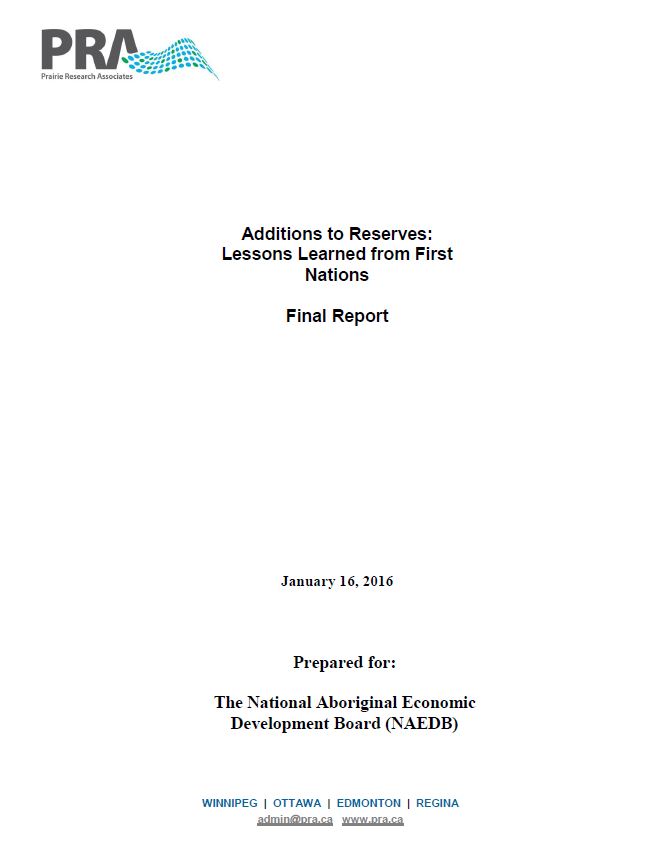What Additions to Reserve mean for First Nations and for Canada
New report identifies best practices in the Additions to Reserve process
The National Indigenous Economic Development Board (NIEDB) is proud to release our latest publication, Additions to Reserve: Lessons Learned from First Nations. The report profiles the experiences of nine First Nation communities across Canada with the Additions to Reserve Process.
Background
Additions to Reserve (ATRs) are an important part of the federal government’s efforts to address First Nations’ historic and unjust loss of land. ATRs also contribute to economic development for First Nation communities, and represent economic opportunities for nearby non-Indigenous communities.
The Board undertook this study in order to better understand some of the barriers encountered by First Nations when adding land to reserve, and to provide first-hand accounts of experiences in the ATR process. This report builds upon the Board’s previous work, which has identified success factors in ATRs, and profiled the economic and fiscal benefits generated by urban ATRs.
Key findings
What are the challenges? The study uncovered that non-Indigenous residents of nearby municipalities sometimes have difficulty accepting the idea of reserve land being located nearby. Challenges can arise from misconceptions that neighboring non-Indigenous municipalities have about First Nations and about the impact of an ATR on their communities and on their tax base. These challenges can complicate the ATR process and create unnecessary delays for First Nations.
What are the best practices in establishing ATRs and overcoming challenges? This report identifies several best practices for both First Nations and other stakeholders. They can be broken down into two categories: (1) relationship-building and (2) changes in policy and process.
1. Best practices in relationship-building:
- Leveraging opportunities to build relationships and enhance understanding between First Nations and nearby municipalities.
- Communicating with non-Indigenous stakeholders about land management and economic development on-reserve to alleviate concerns and address misconceptions.
- Developing a dispute resolution or negotiation mechanism to deal with concerns raised by municipalities and third parties.
- Consulting with other Indigenous groups when applicable to address potential impacts on the rights of other communities.
- Using taxation and fee structures to facilitate positive relationships with local stakeholders and to provide a revenue source for the community.
2. Changes in policy and process to streamline and advance the ATR process:
- Developing a First Nation-specific additions process that is aligned with the new policy on Additions to Reserve.*
- Allowing additions to take place despite ongoing negotiations with municipalities.
- Support businesses operating on reserve.
- Effectively using the land management policy to support economic development.
Why do these findings matter?
We are at a critical point of renewing our relationships and building trust between Indigenous and non-Indigenous peoples in Canada. Additions to Reserve are an essential component of reconciliation and can also stimulate regional economies and contribute to Canada’s prosperity. Creating healthy and sustainable communities in this era of renewed relationships will require meaningful collaboration between all levels of government.
It is our hope that this most recent report from the Board will provide evidence from the field to inform decisions and facilitate greater conversation between all parties.
The NIEDB
Established in 1990, the National Indigenous Economic Development Board is a Governor in Council appointed board mandated to provide strategic policy advice to the federal government on issues related to Indigenous economic development. Comprised of First Nations, Inuit, and Métis business and community leaders from across Canada, the Board helps governments to respond to the unique needs and circumstances of Indigenous peoples in Canada.
This report was prepared by Prairie Research Associates.
Full Report (2017)
*Note: The report was completed prior to the finalization of the federal government’s new Additions to Reserve Policy, which streamlines the process for reserve creation and promotes consultation and collaboration with Indigenous peoples.

